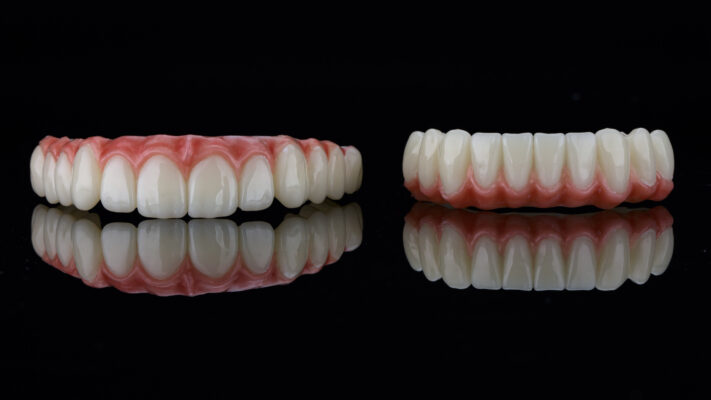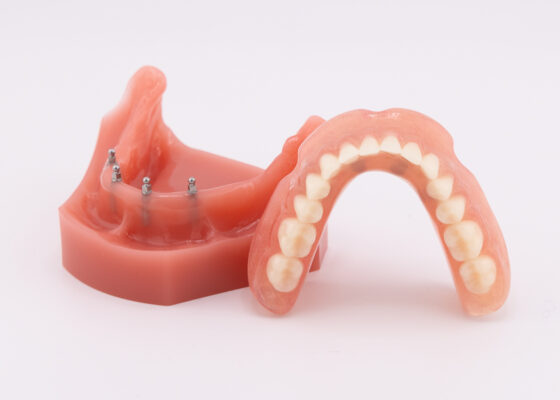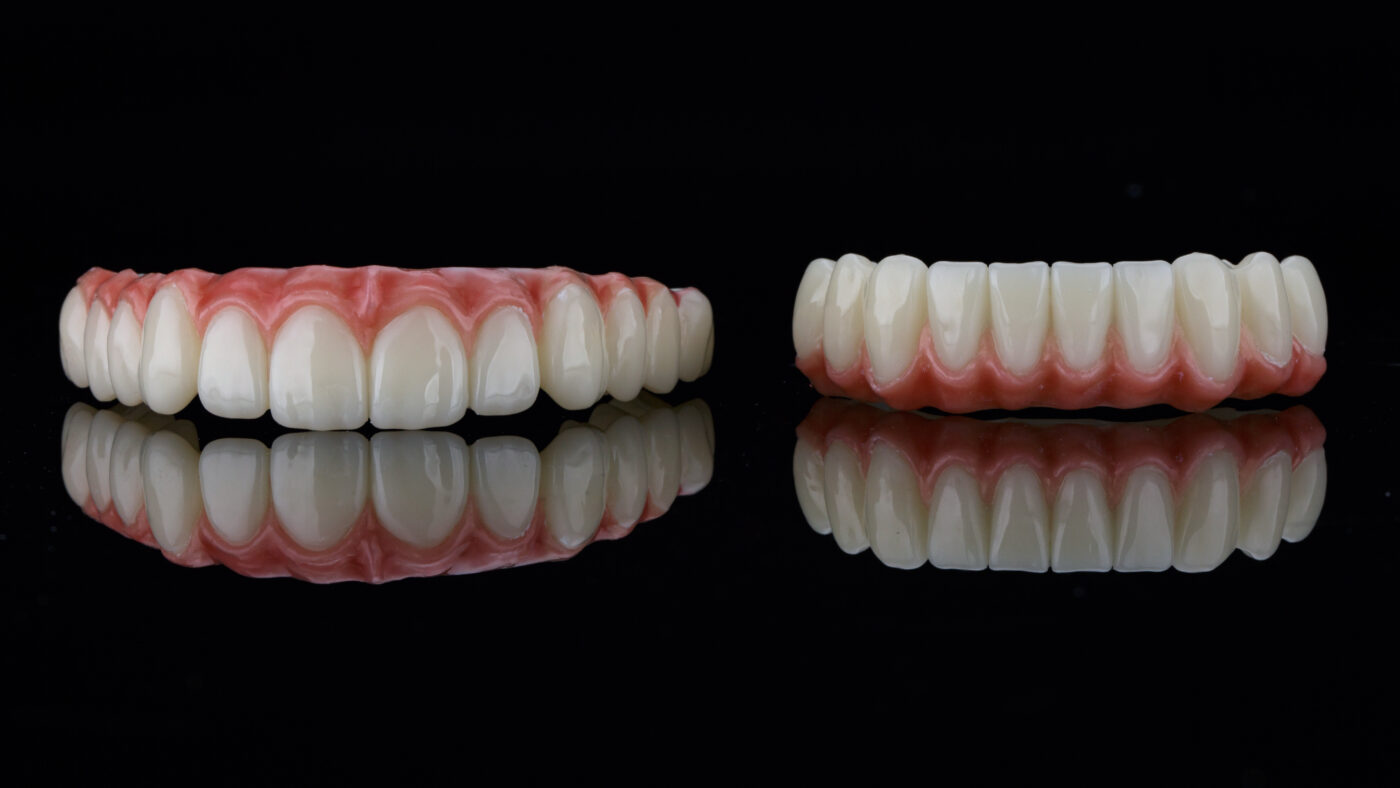Every part of life is shaped by change and the understanding that nothing stays the same forever. According to poet Robert Frost, “Nothing gold can stay.” In this short poem, he talks about the brief beauty of early spring as a reminder that all good things are temporary. So, if everything changes, then can we really speak of such a thing as permanent dentures?
We can! Certainly Dr. Matthew Keider can: He’s been practicing dentistry for more than 30 years. And he’s prepared to help you attain a more permanent dental well-being, even if you’ve lost all your teeth.
Traditional Dentures and Their Drawbacks
 Traditional dentures replace all or some of your teeth. They’re a simple, cost-effective way to solve the problem of toothlessness. Unfortunately, they come with certain drawbacks, including:
Traditional dentures replace all or some of your teeth. They’re a simple, cost-effective way to solve the problem of toothlessness. Unfortunately, they come with certain drawbacks, including:
- Oral discomfort: Shifting dentures can cause gum sores, inflammation, and bleeding. These issues can be very painful and persistent.
- Prosthetic instability: Dentures can slip or fall out. They also don’t give you the bite force necessary to eat certain foods, which can lead to malnutrition.
- Speech difficulty: Unstable or bulky dentures can make it difficult to make certain speech sounds.
Furthermore, dentures don’t protect against bone resorption. Resorption is the technical term for the jawbone loss that occurs after tooth loss. Symptoms of resorption include:
- Changes in facial appearance
- Eating or speaking difficulties
- Headaches
- Jaw pain
- Mouth wrinkles
Resorption can make your dentures loose over time, meaning you’ll likely need periodic adjustments to improve their fit. And if you’ve experienced a large degree of resorption, you may not have the bone density required for traditional dental implants.
What Are Permanent Dentures?
Stabilizing your denture and restoring proper oral function are the goals of implant dentures.
As mentioned, you may not be eligible for traditional implants if you’ve experienced extensive bone loss. However, almost all patients can get mini dental implants. Since mini dental implants are about half the size of traditional implants, we can usually secure them in your existing bone.
Thanks to their smaller size, we can place mini implants without making gum incisions or large holes in the jaw. And, unlike traditional implants, they fuse with the jawbone in just weeks instead of months. In most cases, they also eliminate the need for bone grafting, making the entire process faster, simpler, and more comfortable.
Whether you go in for traditional or mini implants, the first steps are similar. At your appointment, Dr. Keider will capture detailed digital images of your mouth to precisely map out where he’ll place each implant. He’ll also take an impression of your teeth to ensure your restoration is custom-made for a comfortable fit and natural look.
During the mini implant procedure itself, Dr. Keider will insert the implants into your jawbone via your gums. He can then fit your permanent prosthetic to the other end of those posts. This method keeps your dentures in place, eliminating shifting and loosening while improving your bite strength.
Implant Denture Types

Dr. Keider offers several different kinds of permanent dentures:
- Overdentures: These dentures attach to 4-6 mini implants in the lower jaw or 6-8 in the upper. If your current dentures are in good condition, Dr. Keider can often modify your existing dentures to snap onto the implant posts. You’ll be able to take your dentures out at night just as you normally do. The difference is that the implants allow them to stay in place throughout the day without adhesive. So, while the dentures are removable, your mini implants are a permanent part of your smile!
- Semi-removable roundhouse bridge: Also called the Fix-on-Six® system, this treatment combines 6-10 mini implants with a custom zirconia roundhouse bridge. Unlike traditional dentures, you won’t remove the bridge at night, but Dr. Keider can take it out during your visits for professional cleaning.
- Non-removable roundhouse bridge: This prosthetic is the most stable, natural-feeling option. After connecting the prosthetic to 10-12 mini implants, Dr. Keider permanently cements it into place. With this implant denture, you can enjoy a secure, beautiful smile that looks and functions like natural teeth.
Each type of permanent denture will give you the stability, capability, and confidence you’ve been missing.
Benefits of Permanent Dentures
The confidence that comes with eating and smiling normally can truly change the way you feel about yourself every day. And permanent dentures can get you there.
Additional benefits of permanent dentures with mini implants include:
- Decreased invasiveness: Because they don’t usually require bone grafting or extensive surgery, mini implants are less invasive than traditional implants.
- Diminished pain: Mini implants are small, integrate easily with your jawbone, and require no incisions.
- Reduced cost: The relative simplicity of the mini implant procedure makes it more affordable than its traditional counterpart.
- Simplified procedure: We can place mini implants quickly and attach temporary prosthetics to them immediately.
Add to the above the benefits of having a set of dentures that don’t slip, slide, degrade, or weaken, and it’s not hard to see that permanent dentures can improve your quality of life significantly.
Contact Dr. Keider About Permanent Dentures Today
Change is a part of life, but your smile doesn’t have to be one of the things that keeps letting you down. If your current dentures aren’t giving you the comfort, stability, or confidence you deserve, it may be time to explore something more lasting. Dr. Keider can help you find the permanent denture option that fits your needs and helps you enjoy a smile you can count on for years to come.
Take the next step by contacting us today to schedule a consultation.

